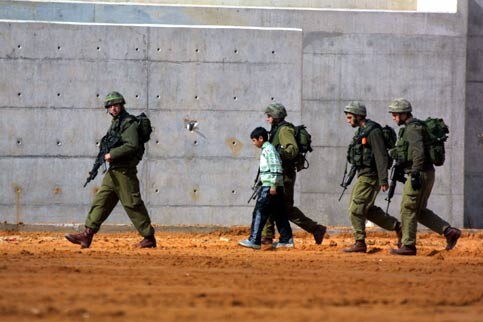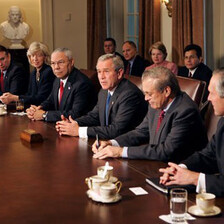The Chicago Tribune 3 December 2003

Al-Khader, 19 November 2003. Israeli soldiers arrest a boy from Al-Khader village after the Israeli army imposed the curfew on the village after two soldiers were killed at the tunnel road checkpoint by an armed Palestinian. (Musa Al-Shaer)
The medium-term future for Israelis and Palestinians remains bleak, but in the long run peace will be created.
It has been almost two months since the last deadly attack on Israeli civilians by a Palestinian suicide bomber and there are currently intense diplomatic efforts, principally by Egypt, to turn this hiatus into a new global cease-fire by Palestinian factions.
Such efforts are in jeopardy, however, because while Israelis have seen a dramatic drop in attacks, Palestinians continue to suffer daily.
Since the last suicide attack, the Israeli army has killed more than 70 Palestinians, the vast majority civilians, among them 17 children.
This carnage prompted Israeli journalist Gideon Levy to observe in a Nov. 30 column in the Israeli newspaper Ha’aretz that, “Quietly, far from the public eye, Israeli soldiers continue killing Palestinians. Hardly a day goes by without casualties, some innocent civilians, and the stories of their violent deaths never reach the Israeli consciousness or awareness.”
Along with this violence, Israel continues to do everything possible to undermine the basis for peace, and the Bush administration, which could use its enormous influence with Israel, chooses instead to do almost nothing. With much fanfare, the U.S. announced recently that it would withhold nearly $300 million of loan guarantees from Israel as a penalty for its continued construction of a massive barrier that annexes huge tracts of Palestinian land. But while this action is designed to look tough, the Financial Times reported that the true cost to Israel is a negligible $6 million in higher interest payments on new loans.
Emboldened by this slap on the wrist, Israel has begun work on a new Jewish-only settlement with 500 homes in the Palestinian neighborhood of Jabal Mukaber near Jerusalem, in the occupied West Bank, Israeli public radio reported on Monday. The new colony, “Nof Zahav,” Hebrew for “Golden Landscape,” follows hot on the heels of the announcement that Israel is giving legal status and providing utilities to dozens of other settlement outposts that Israeli Prime Minister Ariel Sharon had personally promised President Bush would be dismantled.
Bush, with a tough re-election campaign ahead, is unlikely to challenge powerful U.S pro-Israel groups that unquestioningly support Israel’s policies. But nor is there much to be optimistic about in the Democrat field. In September, Democratic presidential front-runner Howard Dean stated that the United States ought to be “even-handed” and should not “take sides” if it wanted to be an honest broker between Israelis and Palestinians.
The strongest protestations of outrage at Dean’s remarks came from his own Democratic rivals, and from the party’s top leadership. This lack of courage and genuine debate in the U.S. about how to break the Israel-Palestine impasse means that peace is pushed further away, and U.S. standing around the world continues to plummet.
Faced with official Israeli intransigence, ineffective Palestinian leadership and U.S. inaction, some Israelis and Palestinians have put their hope in the so-called Geneva Accord, a virtual peace agreement negotiated by former Israeli and Palestinian officials. Yet this accord offers only false hope.
Many Palestinians oppose it because they see it as being fundamentally unfair and unworkable, a rehash of the failed Oslo agreements. The initiative proposes that Israel annex the vast majority of its settlements on Palestinian land, and almost all of Jerusalem. At the same time, Palestinian refugees, forced from their homes since 1947, are expected to give up their right to return. Israel’s government and its hard-line supporters reject the deal because they see it as being too generous to Palestinians. In short, this accord looks superficially promising, but close-up it fails to resolve any of the key issues that have torpedoed every earlier peace plan.
Given these fundamentals, the prospects of a negotiated settlement to the conflict remain close to nil. Yet the terrible situation cannot continue forever. Senior Israeli security officials increasingly acknowledge that Israel’s policies intensify the conflict. But by the time enough Israelis wake up to this and demand change, the basis for the two-state solution that Palestinians and the international community embraced will have been irretrievably lost. Israeli settlements will cover too much land, while Palestinians will in a few years be the majority population.
Some Israelis and Palestinians acknowledge a need to seek a radically different solution: If dividing the land between two peoples is impossible, then why not give 100 percent of the land to both peoples? In practice this means a single democratic state with a constitution that guarantees the political, cultural and religious rights of Israelis and Palestinians, Jews, Christians and Muslims. A common homeland where Jews and Palestinians can flourish instead of fight.
As I have traveled around the U.S. discussing this idea with college students, among them many Palestinian-Americans, Israelis and American Jews, I have found a great deal of openness and support. Above all, there is a strong desire to talk about solutions beyond the tired formulas that have failed for decades. This debate should continue.
Israeli youth this week demonstrated the kind of integration and normality that such a future promises when they voted a 21-year-old Palestinian citizen of Israel, Firas Khoury, the winner of the Israeli version of the TV show “American Idol.” A tiny sign of hope, perhaps.
But hope, nevertheless.
Related Links
Ali Abunimah is a co-founder of the Electronic Intifada. This article was published in The Chicago Tribune on 2 December 2003 under the title “Geneva Accord offering only false hope”.




